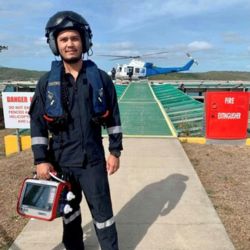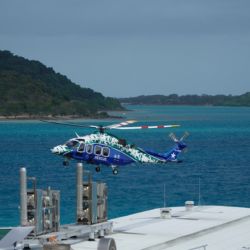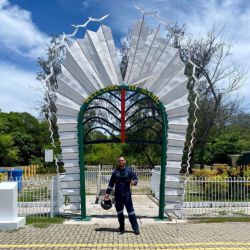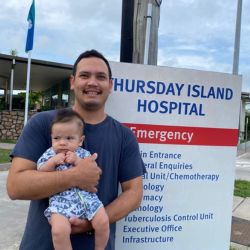Scholarship helps rural medical career take flight
Success! Your request has been sent and a representative will be in contact soon.
 In 2010, the 11th AMA Queensland Foundation Medical Student Scholarship was awarded to Preston Cardelli, who was in his first year at James Cook University. Ten years after graduation, Dr Cardelli is now acting Medical Superintendent at Thursday Island Hospital, as well as retrieval clinical lead for Torres and Cape Hospital and Health Service. The latter role sees him provide aeromedical emergency healthcare for the people of Torres Strait and Northern Cape in state-of-the-art “Lagaw Kuyup” helicopters.
In 2010, the 11th AMA Queensland Foundation Medical Student Scholarship was awarded to Preston Cardelli, who was in his first year at James Cook University. Ten years after graduation, Dr Cardelli is now acting Medical Superintendent at Thursday Island Hospital, as well as retrieval clinical lead for Torres and Cape Hospital and Health Service. The latter role sees him provide aeromedical emergency healthcare for the people of Torres Strait and Northern Cape in state-of-the-art “Lagaw Kuyup” helicopters.
The Foundation caught up with Dr Cardelli recently to discuss his exciting career to date, and what life is like as a doctor on the islands. He also shares his perspective on how the scholarship can make a difference to helping students become doctors, particularly for those contemplating serving in remote locations.
Pictured: Dr Cardelli at work as Clinical Retrieval Lead for Torres and Cape Hospital and Health Service.
Crucial support while studying
Preston grew up in the small farming town of Mutchilba, on the Atherton tablelands, which has a population of 627 at last count.
“When I was at school, they threatened to shut the school because it only had 20 kids. It’s a tiny town, and I’ve always been really proud of the fact that I grew up there,” he said.
Small town life never stopped Preston working hard and dreaming big, and he was successfully accepted into the James Cook University (JCU) medical program in 2010.
Living away from home while studying and being without strong financial backing proved difficult alongside the rigours of the medical degree. When the AMA Queensland Foundation Medical Student Scholarship became available, Preston successfully applied.
At the time, he described being awarded the scholarship as “a breath of fresh air” which enabled him to buy textbooks, attend college, and participate in rural rotations in Weipa and Mt Isa.
In 2013, Preston was featured as part of the Foundation’s End of Financial Year Appeal in 2013, helping to raise a record amount to support future Foundation scholarships.
“If I had the chance to directly speak with a donor, I would let them know how thankful I was for their contribution to the Foundation, and how their generosity makes things possible for us recipients that perhaps would not be if it weren’t for them. I would go out of my way to ensure that they realise how much I really do appreciate the bursary and that I am constantly thinking of their selflessness and look to them as idols who I aspire to be,” he said at the time.
Gaining critical skills
Able to press on with confidence in his studies thanks to the scholarship, Preston completed three years of medical school at JCU in Townsville, before transferring to Cairns to complete the remaining three clinical years. He took on some interesting placements during his time as a medical student, but his final placement on Thursday Island left a lasting impression.
As the referral hospital for 17 primary health care centres within Torres and Cape Hospital and Health Service (TCHHS), Thursday Island Hospital’s services span primary care, general medicine, maternity, paediatrics, as well as emergency care. The hospital also has its own aeromedical retrieval base staffed with doctors supplied by TCHHS.
 “We’re unique on Thursday Island here, whereby we as a hospital and health service - Queensland health employed, fly and run the rescue aeromedical base. The base is located on Horn Island, but in terms of medical support, Thursday Island Hospital supply the doctors and Queensland Ambulance Service supplies the paramedics.”
“We’re unique on Thursday Island here, whereby we as a hospital and health service - Queensland health employed, fly and run the rescue aeromedical base. The base is located on Horn Island, but in terms of medical support, Thursday Island Hospital supply the doctors and Queensland Ambulance Service supplies the paramedics.”
The unique makeup of the work on offer during his placement was inspirational to Preston.
“I just thought I've got to come back here someday. So, I kept in touch with a couple of the key people and spent the next five or six years jumping through all the hoops that were required to get the right skill set for Thursday Island,” he said.
After graduating from JCU in 2015, Preston, now Dr Cardelli, was set on increasing his skills for the role and commenced training towards a fellowship with the Australian College of Rural and Remote Medicine (ACRRM).
As a junior doctor based at Cairns hospital, rotations also included Atherton and Innisfail district hospitals. In his third year after graduation (PGY3) Dr Cardelli completed his practical experience in critical care, before completing additional procedural training in anaesthetics PGY4. His final rotation was six months of primary care in in the small town of Kuranda.
Pictured: One of the Lagaw Kuyup helicopters used for aeromedical retrieval across Torres Strait and Northern Cape
Making it back to Thursday Island
In August 2020, with two years left on his Fellowship, Dr Cardelli took a position on Thursday Island, having completed the necessary skill sets required for the challenging role.
“It was my first senior role, doing on call, learning new skills sets, learning aeromedical retrieval, flying around in the rescue helicopter, looking after patients under those unique conditions.”
“It was a massively steep learning curve, I doubt I’ll ever encounter such as steep learning curve again. We train as junior doctors for so long to always call for your senior if you're ever worried or concerned - and then all of a sudden, now I'm the senior being called. That was an interesting transition,” he said.
Dr Cardelli counts some incredible mentors as being great grounding for the role.
“I've been very fortunate in all my clinical rotations to have just really awesome people leading and I had some really good mentors, informally and formally. I’ve watched those above me and seeing how they operate, how they work, how they carry themselves and see the joy that they get out of the job, even though there's some really challenging times. That's what kept me going, and wanting to aspire to be like them,” he said.
Five years on, Dr Cardelli is now the acting Medical Superintendent at Thursday Island Hospital, as well as being the retrieval clinical lead for Thursday Island Hospital retrieval service.
Dr Cardelli said the part about the job he fell in love with, and still loves, is that the work covers the full breadth of what it is to be a rural generalist.
“On Monday I could be in the primary care clinic doing booked primary care GP appointments and then Tuesday I could be working in the emergency department, Wednesday on the ward, and Thursday somewhere else in theatres. Then I am often on call at night, and that would be either in anaesthetics, or on retrieval. It’s not always the case that every day is different, but often when I look back on the month that’s been, the role does require a generalist skillset in the truest sense.”
Deeply fulfilling work
 Dr Cardelli has always been motivated to pursue fulfilling work, and ever since his placement days, had acknowledged the need for better health outcomes for Aboriginal and Torres Strait Islander communities, and particularly those in remote regions.
Dr Cardelli has always been motivated to pursue fulfilling work, and ever since his placement days, had acknowledged the need for better health outcomes for Aboriginal and Torres Strait Islander communities, and particularly those in remote regions.
“I always wanted to do something that felt really meaningful within medicine. The over representation of chronic diseases in Aboriginal and Torres Strait Islander populations means that you will be always doing fulfilling work if you work with those populations.”
“That’s one piece of advice I’ll always stress to junior doctors as much as I can - chase something that will be fulfilling. I'm fortunate that I feel like I have that in my role. I've heard it from enough people now that don't have it, and that seems to cause a lot of agony in people,” he said.
Describing the patient demographic in the Torres Straits as “incredible”, Dr Cardelli appreciates the strong sense of culture and community.
“I get welcomed into people's homes, invited to social events. I've been to tombstone openings, weddings and funerals, even. To be invited to that stuff is just not something that I think would happen anywhere else,” he said.
He also notes the immense respect for medicine that exists in the community.
“When I walk through the grocery store with my wife, community members refer to me as “Doctor Preston” even though I had introduced myself as “Preston.” The community is very polite, they're very respectful,” he said.
Alongside an embracing and culturally rich community, is the retrieval work. The team visit remote islands by helicopter, often in the dead of night, to tend to, and pick up critical patients across the Torres Strait’s 48,000m2 area - sometimes never meeting the rest of the island’s inhabitants in the light of day.
“I went to one of the outer islands two weeks ago, and people came up to me asking if I was new. I said, no, I have actually been working here for 5 years, and I’ve been to your island at night 10 or 12 times, but I just haven’t visited by day to do a clinic here yet, so you’ve never seen me!”
Pictured: Dr Cardelli on Masig Island in the Torres Strait
 Sinking in roots
Sinking in roots
Since moving to Thursday Island Dr Cardelli has started a family and is now the proud father of two beautiful children, the youngest of which was born in mid-October in the Thursday Island Hospital. This is something he said he and his wife feel incredibly proud and privileged to have experienced.
“To believe so much in the service you work to have your own children there, just shows how much this place means to us and how much trust we have in our colleagues and systems.”
He says it’s amazing his children will be fortunate enough to grow up in the Straits.
Pictured: Dr Cardelli outside Thursday Island Hospital with his child
Scholarship can help support remote placements
As a senior doctor and acting superintendent in a remote area, Dr Cardelli acknowledges that extra costs can be incurred with remote placements, such as fuel or flights. For some students, the Foundation scholarship may help remove that barrier that allows them to take remote placements when they’re available.
“Now there's the obvious things that the scholarship helps with in any regard and that's the attainment of equipment - a new laptop, new stationery, clothes, or whatever it may be, but it's that other stuff that might allow you to do an additional thing while on placement that might mean that you're more likely to pursue that as a career,” he said.
He adds that even recreational activities can help future doctors feel connected to remote areas.
“Often, we say to the students, oh - you must go to this island and visit this pearl farm or do this activity, but the students often say they don't really have much money or can’t afford the $100 ferry ride over there. So having the extra money can make that possible.”
“It’s important to show them that this place is more than work, and hopefully there’s more likelihood they’ll come back and return to the place and give back.”


